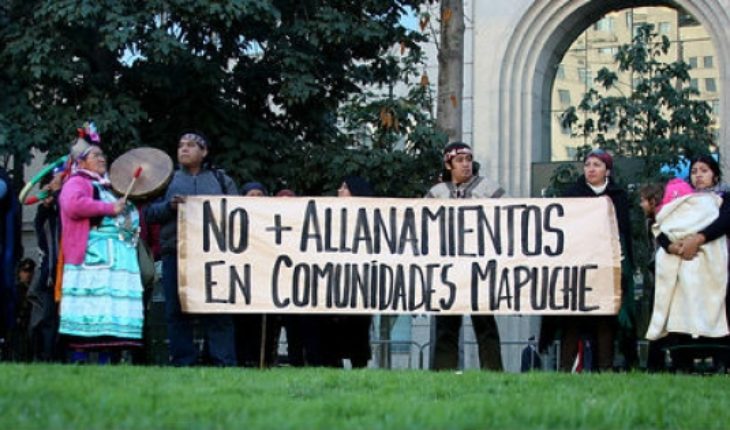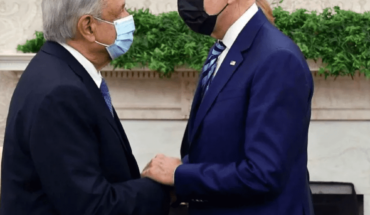A strong focus on violence against the Mapuche women, with a call for the State to dictate a specific Protocol on raids in the communities, formulated the National Institute of human rights at its Sit annual report business of the 2018 human rights handed over in a ceremony that coincided with the 70th anniversary of the signing of the Universal Declaration of human rights.
Although the report this time analyzed not specific the situation of the mapuche population nor the recent facts related to the killing of the comunero Camilo Catrillanca (given that the topics are defined at the beginning of the year), the document part with an analysis of the violence against indigenous and rural women.
“Examples of violence against indigenous women have been the case of Lorenza Cayuhan, mapuche women deprived of liberty, which, in October 2016, gave birth to her daughter in the clinic of the woman of the sanatorium German de Concepción, engrillada and with the presence of a gendarme v Aron in the delivery room; and repression and arrest by special forces of police, of thirty women mapuche farmers because they sold their products in the streets of Temuco,”the report said.
In this line, in the presentation of the document, the President of the Agency, Consuelo Contreras, enhanced numerous situations of “violence and abuse of power, product of the socio-cultural conflict that occurs in the region of La Araucanía”.
The stories of abuse one of the testimonies that the report is that of Paola Nahuelhual: “I remember that I lived in a community in conflict for 6 years and many times I was noting injuries, I was beaten many times, I have the marks still in the body of the” Police beats. “They come to pave a community without giving any explanation, as you are in the field and no one recording, in the field it is different, in the field all OK, because there is no who is there, there is no witness, then the beatings and violence are excessive”.
Another included tale is the Attorney Myrna Villegas. “I have very obvious case of a lady, who reported that they were paving, they entered his home and carabineer aimed towards the younger son was beside it, then it is a form of torture, you look? And that, at some point, the carabiner first pointed to the son, as a subway say, pointing to, 11-year-old boy would have the child, or 12… and ultimately it moved the cannon and shot her in the leg,”says.
The same NHDR recalled that its legal and Judicial unit has produced resources of amparo on behalf of women and children from indigenous communities, victims of police violence. One of them was by the Mapuche Lof Mawidanche case and Trapilwe, raided on April 30, 2013, in the commune of Freire by PDI staff raided homes without judicial authorization, affecting 12 children, a pregnant woman of almost six months, and various other people and n the intimacy and privacy of your home. Was also presented an appeal by Lof Rankilko case, which dates back to 2016 and that affected indigenous girls and six boys mapuche of this sector of the low Malleco, who along with their fathers and mothers were exposed to a violent eviction and destruction of their homes and equipment, in the context of a complaint by of non-violent usurpation.
The report takes into account also threats of death to women leaders and some young mapuche, as a sort of indirect repression towards parents who are mapuche authorities.
Thus, it describes what has been lived by Vania Queipul, “daughter of lonko Queipul, who was arrested at age 16, when he complained before the Court during the trial of her father. During his detention he was threatened that apply you torments if not stated. He threatened her with a torture mechanism and was a girl”, review the report.
Taking into account those cases, the NHDR “recommends that the Ministry of the Interior and public security develop a specific Protocol on raids communities mapuche, which is guarding the rights of children, adolescents with special attention and” the women”.
But another element that emphasizes Myrna Villegas is the skepticism of Mapuche women facing justice. “How is going to ask justice to the same institution that had taken off at six in the morning to their children in raids? They do not rely on the Chilean justice because they are criminalized. A Prosecutor in La Araucanía how to protect a mapuche woman?, if those same tax are those who ordered the raids where come the police, sometimes with a Prosecutor. They have reported cases where come even with a Prosecutor, there to supervise the procedure and take the women and children at five in the morning in winter”.
Hence another of NHDR recommendations is that the “Ministry of Justice and human rights seek special attention to ensure access to justice for rural indigenous and rural women, safeguarding that geographical isolation and some elements “cultural (including language) does not constitute constraints so that these women exercise this right”.
The other themes of the report document contains a total of seven topics, addressing also subjects such as immigration policy, places of memory, natural resources, business and human rights, the rights of older persons and the obligations of the State and the solution to the waiting lists in the public health system. It also devotes a chapter to technological innovation, protection of personal data and human rights.
translated from Spanish: Report 2018 NHDR reveals raw testimony of police violence towards women mapuche
December 10, 2018 |





